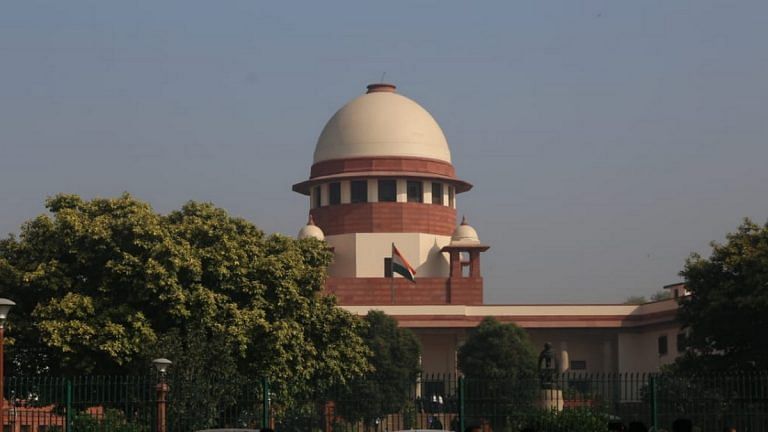New Delhi: The Supreme Court Thursday suggested appointing ad-hoc judges in high courts to overcome the vacancy crisis in the judiciary and reduce the number of pending cases.
A bench led by Chief Justice of India S.A. Bobde made this suggestion but clarified that this will not stall regular judicial appointments in high courts.
“We don’t want the system of regular appointments to be stalled for ad hoc appointments. But there are suits pending for 30 years which also include criminal trials. It is not a matter of opinion but fact that judges who have been there for 15 to 20 years can continue to dispose off matters,” said CJI Bobde.
The hearing comes almost a week after the central government told Parliament that over 38 per cent of sanctioned posts of judges are lying vacant across the 25 high courts in the country.
Law minister Ravi Shankar Prasad said that 419 posts of a total of 1,080 posts remain vacant in India’s high courts.
The bench, which also comprised justices Sanjay Kishan Kaul and Surya Kant, observed that appointment of ad-hoc judges is the “need of the hour” and will be essential to control the “out of hand” pendency in courts.
In a related direction, it also asked the central government to inform the court about the status of the 55 names that were cleared by the SC collegium for appointments in various high courts but have not been notified by the government yet.
The court observed that there should be a reasonable time frame for the law ministry to respond to the appointments.
“After the collegium recommends, they (Centre) have to reply in a time bound manner. Each stage there needs to be a thought process,” the bench said.
Also read: CJI Bobde recommends Justice NV Ramana as successor
‘Constitution permits appointment of ad-hoc judges’
The SC had asked all 25 high courts to respond to a public interest litigation filed by Lucknow-based non-profit organisation, Lok Prahari, asking for the appointment of retired judges as ad-hoc judges under Article 128 of the Constitution.
Article 128 talks about “attendance of a retired judge” as the judge of the Supreme Court.
It states that the Chief Justice of India at any time, with the previous consent of the President, may request any person who has held the office of a judge of the Supreme Court or the high court to sit and act as a judge of the Supreme Court.
Similarly, under Article 224A, even retired high court judges can be appointed as ad-hoc judges to HCs.
The CJI noted that the provision under Article 224A is not being used.
“This is not our suggestion or the petitioner’s. It is there in the Constitution. We will lay down guidelines stating if pendency goes beyond a certain limit for say more than 8 or 10 years, then the Chief Justice will automatically recommend the appointment of an ad hoc judge. After Collegium approves, they can sit and it (term of ad hoc judges) can be extended. Other factors like accommodation have to be looked into,” he said.
The bench fixed 8 April to hear the matter again and said that it will not allow any adjournments.
Also read: ‘Why not promote education?’ — SC says affirmative action is not just reservation
Ad-hoc judges would not be a threat
Meanwhile, the central government’s counsel, Additional Solicitor General R.S. Suri, expressed reservations over the bench’s suggestion and said ad-hoc appointments can be made after vacancies for regular posts are filled.
At this, CJI Bobde remarked: “We are not sure how much cooperation we are receiving from you regarding that. But ad hoc judges are not a threat.”
Divergent views emerged during the hearing on the court’s proposal. While the lawyer for Allahabad High Court supported the suggestion, the counsel for Uttarakhand High Court backed the Centre’s stand.
However, Justice Kaul intervened to clarify again that the process of appointing a regular judge will have to be followed. “We cannot say that the High Court Chief Justice can suo-motu appoint ad hoc judges,” he said.
The CJI further added: “What we have in mind isn’t that the system of appointment of regular judges should be stalled or stopped by ad-hoc. It (ad-hoc appointments) has nothing to do with regular appointments. They will be considered junior most and it is not a threat to anybody in functioning of the court.”
‘Law ministry to respond within reasonable time frame’
On the delay by the law ministry to finalise judicial appointments, the bench observed a reasonable time frame should be fixed for the government to respond to collegium resolutions.
Justice Kaul revealed there are many names which have been cleared by the Supreme Court collegium but are pending with the ministry for more than six months.
The bench then asked Attorney General K.K. Venugopal to make a statement regarding clearing of the 55 names. Venugopal was told that a chart, prepared by Justice Kaul, will be shared with him and the law officer should respond accordingly.
Also read: SC collegium clears 13 names as judges for Bombay HC despite red flags by two senior judges
